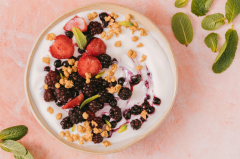Calcium is widely recognised for its role in promoting strong bones and teeth, but this essential mineral is involved in much more than just skeletal health. It plays a crucial part in maintaining healthy skin, hair and nails, while also supporting a range of vital functions in the body. From muscle contraction to nerve signalling, calcium is required in varying amounts at different stages of life, making it an indispensable nutrient for overall wellbeing.
The beauty benefits of calcium
Skin health: Calcium is a crucial mineral for maintaining healthy, hydrated skin. It supports skin cell turnover and regulates the production of sebum, the skin’s natural oil. This helps create a balanced, protective barrier that locks in moisture and guards against dryness, inflammation and environmental damage. Calcium also plays a role in the skin’s wound healing.
Hair strength and growth: Calcium contributes to keratin production, the protein that forms the structural foundation of hair. A deficiency in calcium can lead to brittle, lifeless hair prone to breakage. Additionally, calcium supports the function of enzymes that stimulate the hair follicle cycle, promoting healthy hair growth.
Strong nails: Calcium is key to the formation and strength of nails. If your nails are weak, brittle or split easily, it may indicate inadequate calcium levels.
Holistic beauty from the inside-out
As a naturopath, I believe external radiance is a reflection of internal health. Calcium also supports key internal functions, including muscle contraction, hormone regulation and nerve signalling, all of which impact vitality, energy and the body’s ability to regenerate. Life events and hormonal shifts can significantly affect calcium requirements. Here are some phases of life where calcium requirements increase:
Pregnancy: During pregnancy, calcium requirements increase significantly to support the developing baby’s skeletal system. The mother’s body prioritises the baby, meaning if dietary calcium is insufficient, it will draw from the mother’s bone reserves. This can lead to calcium depletion, manifesting as brittle nails, hair thinning and dull skin in the mother. Pregnant women require approximately 1000mg of calcium daily, with teens (who are still building their own bone density) needing up to 1300 mg.
Breastfeeding: Calcium continues to play a crucial role postpartum. Breastfeeding mothers transfer calcium through their milk to support the infant’s growth. If calcium intake is inadequate, it can lead to
temporary bone density loss in the mother, affecting overall health.
Menopause: Post-menopause, women experience a drop in oestrogen levels, which affects calcium absorption and bone health. This stage also makes the skin thinner, less elastic and more prone to ageing. Maintai





